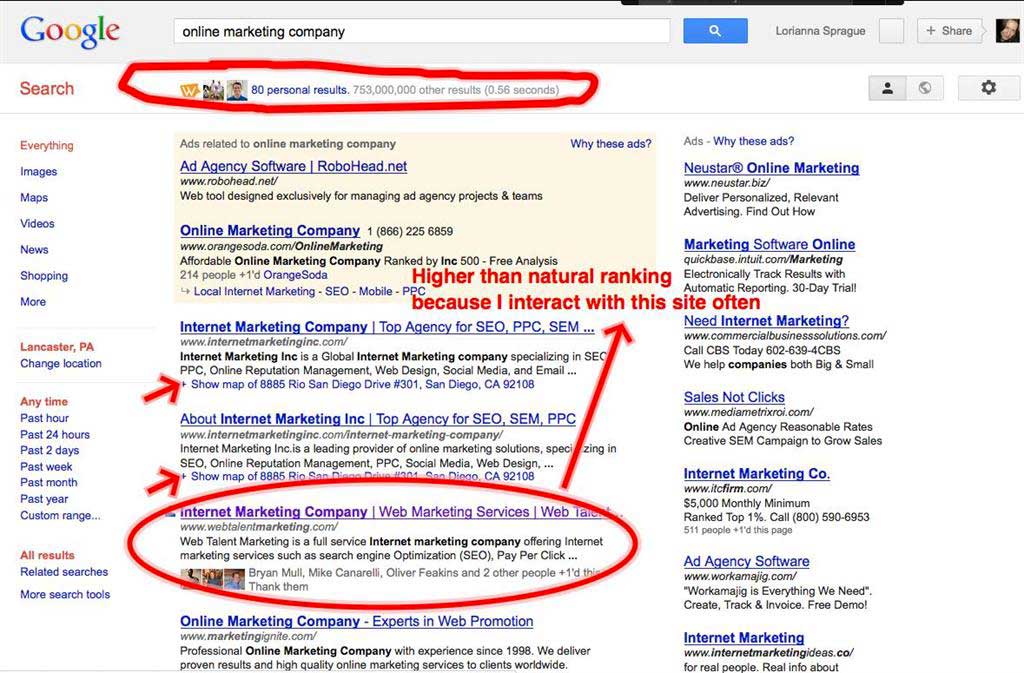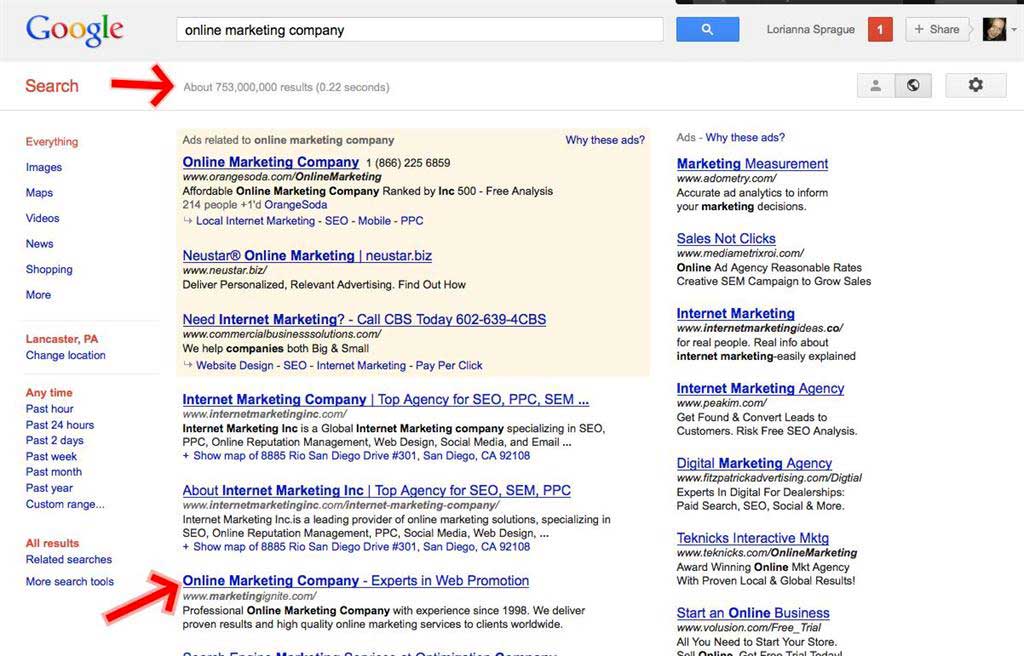OK, search engine optimization ranking reports are not dead... but
Google's personalized search is making agency ranking reports less and less relevant.
Many agency clients in emerging SEO (search engine optimization) and SEM (search engine marketing) markets, such as ours (central Pennsylvania), may still be chasing the wrong metrics and using them to measure agency success. Why? Because those clients have been trained to look at unique website visits and at keyword rankings.
The Problem
Google wants to rank site content based on a person's search behaviors, preferences, etc.

Because I have frequently engaged with webtalentmarketing.com and its associated social profiles, especially—I suspect—its Google+ profile, the site ranks higher for my personalized search results than it would for nonpersonalized results.
So, how likely is it that a client's site will rank well for a search in the client's market, where the searcher has made repeat visits to or purchases from the client's competition (i.e., has been repeatedly engaged with that competitor)?
If the searcher is engaged with the competition, the relationship is working for the searcher and the website. Google prefers to repeat processes that have proven successful.
What does that mean for a client? When you give a client a ranking report, the report shows where the client would show up in Google if personalization weren't in effect. But that's no longer a viable scenario.
The following image is of a search for the same term, but not personalized:

Webtalentmarketing.com is no longer in position 3, and the ranking results report would tell the client its website is ranking in position 25; in fact, it may rank higher for some and not at all for others.
On the flip side, marketingignite.com will have a ranking report showing its site ranking in position 3 for "online marketing company," but in my personalized results that is not where it shows up.
In short, ranking reports are misleading.
Personalization is now forced on users of Google and Bing if they are not logged in. When logged in, you have the option to turn personalization off—if you are aware of the possibility, and have an idea where to turn it off. (See the two paired gray buttons in the upper-right-hand corner of the screenshot? The globe icon means "un-personalized" and the person icon means "personalized").
Therefore, a ranking report is now an indicator of relevance, not a metric for judging the average click-through rate of a listing in position X or to determine what your traffic should be.
The Solution
How do you reach searchers in your market if Google is changing the way the online search game is played? The answer is... engagement—via social and website content, and via advertising.
Social Engagement
Google continues to incorporate social signals into its ranking algorithm. But how will that play into search ranking? If your competitors engage with their market via social campaigns and initiatives, and you don't, you'll be missing out on the added ranking factors that place your site in front of searchers.
Content Publishing and Marketing
More better-quality content equals more links. Why? Because content that people enjoy and find value in is content they want to share, bookmark, and come back to again and again. More links and shares equals greater page and domain authority. Greater page and domain authority equals higher ranks in search (which is now just about relevance).
Once you have published content ("built it"), you cannot assume that visitors will just arrive ("they will come"). You must have a content marketing plan and a content creation plan. Consistently providing quality content will build credibility, brand awareness, and trust.
If you create conversion goals for content pages designed to generate leads, and market that content well, you have the potential to get in front of the consumer while she is in a research phase. Content served in search results for informational queries would be informational, not transactional. Therefore, the ranking factors Google will use to serve informational content would be based on user engagement—time on site, bounce rate, and pages per visit for people who begin on that page—as opposed to e-commerce conversions.
Note: Even though ranking reports are now inaccurate like much of the data SEOs use, Google's Webmaster Tools provides your top 1000 queries each month, on a rolling 30-day period, and their average rank in search over that time. You cannot get data prior to the 30 days Google shows you, so you should download your WMT data every 30 days for your records.
Advertising: Search and Content Networks
You should be advertising online. Your ads should include a value proposition and a call to action that leads to a landing page on your site. That page should reiterate the value proposition and call to action, and it should be optimized for conversion and user experience.
If users get to your page via an ad and convert, you are demonstrating to Google that you are actively improving and care about user experience (UX), and Google will factor that into its ranking algorithm.
I don't know the formula, but if your company converts X number of users for product A, for example, and your competitor converts X or less for comparable product B, then Google could potentially consider your site a viable and relevant option to serve to a consumer who has purchased from your competitor. Google might do that because searchers may have a better experience with your site, and, possibly, your product because more people seem to be buying the comparable product from your site.
OK, but search takes up only 4% of time spent online. So how do you get in front of consumers in your market when they aren't using search? Follow customers around and serve them banner ads on a CPM (cost-per-thousand-impressions) basis to keep your brand and value proposition in front of them. Send a newsletter, or use email marketing. Use conventional offline marketing media to direct customers to your site and social profiles.
Continue to engage them in all areas, and, over time, you will naturally improve traffic and conversions on your site—no matter where you rank in search results.



